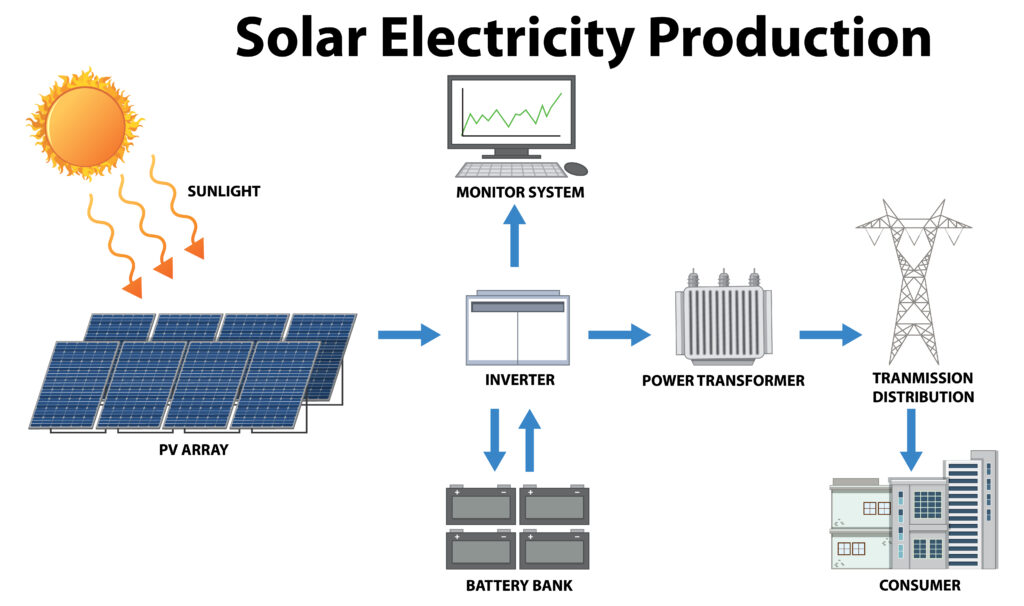Battery storage systems play a crucial role in the energy sector, enabling the efficient utilization of renewable energy sources and ensuring a reliable power supply. Understanding the lifespan of battery storage is essential for maximizing its benefits and making informed decisions.
Battery Storage Basics
What is battery storage?
Battery storage refers to the technology that allows the storage of electrical energy in batteries for later use. It involves the conversion of electricity into chemical energy and vice versa, enabling the storage and retrieval of energy as needed.
How does it work?
Battery storage systems consist of multiple interconnected batteries that store and release energy. When excess energy is available, the batteries are charged. When demand exceeds supply, the stored energy is discharged to meet the requirements.
Why is it important?
Battery storage is important for residential homeowners with solar panels for several reasons:

Image by brgfx on Freepik
- Energy Independence: Battery storage allows homeowners to store excess energy generated by their solar panels during the day and use it at night or during cloudy periods. This reduces their reliance on the grid and provides a level of energy independence, making them less vulnerable to power outages or fluctuations in energy prices.
- Maximizing Self-Consumption: Without battery storage, excess solar energy generated during the day is typically sent back to the grid, often at a lower rate than what homeowners pay for electricity. With a battery, homeowners can store this excess energy and use it later, thus maximizing their self-consumption and reducing the amount of energy purchased from the grid.
- Time-of-Use Optimization: Many regions have time-of-use (TOU) electricity pricing, where the cost of electricity varies based on the time of day. With battery storage, homeowners can store energy when electricity rates are low and use it during peak rate periods, helping them save money on their energy bills.
- Backup Power: Battery storage provides a source of backup power during grid outages. This is particularly valuable in areas prone to extreme weather events or unreliable power supply. Homeowners can maintain essential appliances and devices running even when the grid is down.
- Grid Support: Battery systems can also provide benefits to the overall electrical grid. They can be used for grid stabilization, load shifting, and demand response programs, which help balance energy supply and demand and reduce strain on the grid during peak times.
- Environmental Impact: Using battery storage alongside solar panels can further reduce a homeowner’s carbon footprint. It allows them to store and use clean, renewable energy, decreasing the need for fossil fuels and decreasing greenhouse gas emissions.
- Future-Proofing: As technology advances and the energy landscape evolves, having battery storage can future-proof a homeowner’s energy system. It positions them to take advantage of new energy management and grid interaction capabilities that may become available in the future.
- Increased Resilience: In addition to providing backup power during outages, battery storage can enhance a homeowner’s overall resilience by providing stability to their energy supply. This can be especially important in remote or off-grid locations.
- Reduced Strain on the Grid: As more homeowners adopt solar panels, battery storage can help reduce the strain on the electrical grid by storing excess energy locally and decreasing the need for centralized electricity generation.
Overall, battery storage complements residential solar panel systems by improving energy utilization, reducing costs, enhancing resilience, and contributing to a more sustainable and efficient energy future.
Factors Affecting Battery Storage Lifespan
Factors Affecting Battery Storage Lifespan
The type of battery chemistry significantly influences its lifespan. Lithium-ion batteries, for example, have a longer lifespan compared to lead-acid batteries and are commonly used in energy storage applications.
Temperature
Extreme temperatures, both hot and cold, can negatively impact battery performance and lifespan. It is essential to maintain batteries within the recommended temperature range for optimal operation.
Depth of Discharge
The depth to which a battery is discharged affects its lifespan. Shallower discharge levels result in longer battery life, as deep discharges can cause chemical reactions that degrade the battery’s capacity over time.
Life Cycle
The number of charge-discharge cycles a battery can undergo before its capacity significantly degrades determines its cycle life. Battery technologies have different cycle life capabilities, and manufacturers often provide this information in their product specifications.
Maintenance
Regular maintenance practices, such as monitoring battery health, cleaning, and replacing faulty components, can extend the lifespan of battery storage systems. Neglecting maintenance can lead to premature failure and reduced performance.
Calculating Battery Storage Lifespan
Understanding capacity and energy
Capacity refers to the total amount of charge a battery can hold, while energy represents the actual amount of charge available for use. It is crucial to understand these concepts when estimating battery storage lifespan.
Calculating usable capacity
Usable capacity takes into account factors such as depth of discharge and battery efficiency to determine the actual capacity available for use. It is important to consider usable capacity when assessing the lifespan of battery storage systems.
Estimating battery degradation
Battery degradation refers to the gradual loss of capacity over time. By analyzing historical data, manufacturers can estimate the average degradation rate of battery storage systems and provide insights into their lifespan.
Determining lifespan based on usage patterns
Usage patterns, including the frequency and depth of discharge, significantly impact battery lifespan. By considering these factors and estimating the average daily energy consumption, it is possible to determine the expected lifespan of battery storage systems.